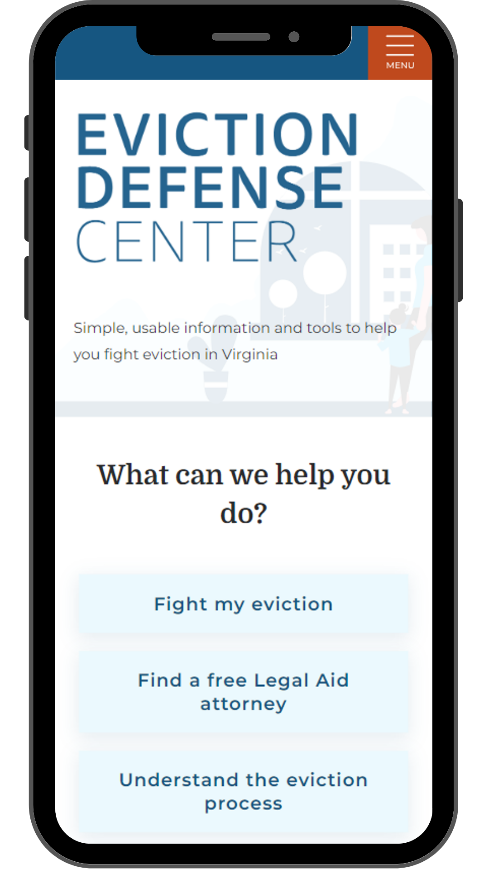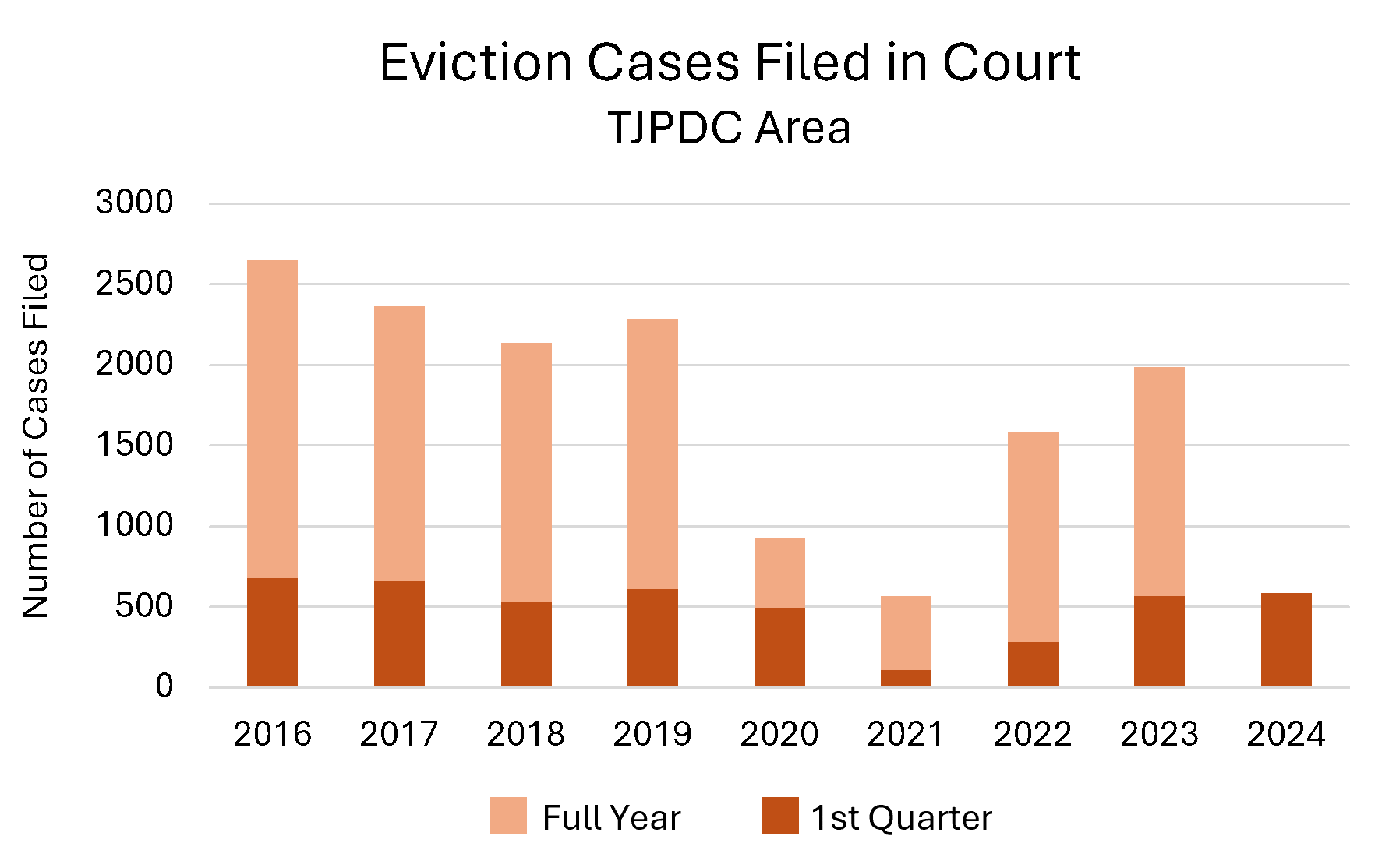
PHIL STOREY
Phil Storey is a housing attorney at VPLC and leads the Eviction Defense Center (FightMyEviction.org). A California native, he has lived in Virginia since 1998, the first 13 years in Charlottesville, where he graduated from UVA Law School in 2009. He has been part of VPLC’s housing advocacy team since 2018.
A FAMILIAR PROBLEM
 The Commonwealth’s eviction crisis is nothing new. A New York Times cover story in 2018 spotlighted the issue and sparked new attempts to address the problem with policy and funding.
The Commonwealth’s eviction crisis is nothing new. A New York Times cover story in 2018 spotlighted the issue and sparked new attempts to address the problem with policy and funding.
Throughout Virginia, well over 100,000 eviction cases are filed in a typical (non-pandemic) year. Currently, Legal Aid programs have capacity to meet perhaps 10% of the need for assistance.
For four years, including through the pandemic, Virginia Poverty Law Center (VPLC) ran the Eviction Legal Helpline. It provided thousands of our neighbors with information and eviction advice from an attorney. But the demand for services overwhelmed the program, and VPLC retired it last year to work on a new, more scalable approach.
A NEW TOOL
To help more Virginians stay housed, VPLC recently launched a new legal resource, currently in beta version: the Eviction Defense Center (EDC). It offers a powerful combination of legal orientation and practical tools for easy use in court, in both English and Spanish. It is a simple and accessible online tool for renters who cannot get more intensive help from Legal Aid.
Along with answers to common eviction questions, the EDC offers situation-specific information to users who answer a short series of questions. This allows those early in the process to address problems before they end up in court. For those with an eviction court case, the EDC provides more extensive tools to help them fight their case in court.
HELP FOR COURT PROCEEDINGS
The court process can be confusing and intimidating, even with an attorney. Many people facing eviction cases alone find the proceedings frustrating, feel unfairly treated, or simply give up. Too often they lose in court even if the law is on their side.
The EDC provides users with printable scripts and forms to help them in court. The scripts make it easy for users to tell the judge what they want, even if they’re nervous. The forms, for users to hand to the judge, explain how the law may be on the side of the renter. This is a new way for renters without lawyers to effectively participate in the court process.
FURTHER STEPS
As the Eviction Defense Center grows and improves with user feedback, VPLC plans to offer additional support to service providers who work with renters. It is developing a kit to help them assist their clients to use the EDC most effectively.
VPLC also plans to work with community groups in locations with high eviction rates on advocacy campaigns using the EDC. By preparing many more renters to show up to court ready to raise valid defenses, we hope to make the legal process fairer and less intimidating.
The EDC represents one piece of VPLC’s legislative and advocacy efforts to make Virginia’s laws and processes fairer for our low-income neighbors. The organization is developing more tools like it to help Virginians deal with other civil legal issues as well, such as debt collection and access to public benefits.
For more information on VPLC and these efforts, visit www.vplc.org or email phil@vplc.org.
Virginia Poverty Law Center (VPLC) is the state support center for all civil legal aid programs in Virginia. VPLC’s work breaks down systemic barriers that keep low-income Virginians in the cycle of poverty through advocacy, education, and litigation. Visit vplc.org for more information.
- Improved Manufactured Home Lot Rental Act (MHLRA) (Del. Delaney, Sen. Hashmi)
- HB 572 / SB 232 increases protections for manufactured home park residents and removes confusion from the MHLRA by limiting the amount of late fees park owners can charge for unpaid rent, granting a right of redemption for tenants facing eviction for unpaid rent, prohibiting the automatic renewal of a lease if the tenant gives proper notice of termination, and clarifying the allowable reasons for eviction.
- Increased Relocation Funds for Manufactured Home Park Residents (Del. Krizek)
- HB 1397 requires a manufactured home park owner to provide each resident with $5,000 to cover relocation expenses if their rental agreement is terminated due to the sale of the park to a buyer planning to redevelop or change its use.
- Automatic Eviction Record Expungement (Del. Hope)
- HB 73 requires courts to automatically expunge eviction records for dismissed cases after 30 days and for nonsuited cases after 6 months.
- Early Lease Termination for Survivors of Domestic Violence (Del. Delaney)
- HB 764 gives victims of domestic violence or sexual abuse the right to terminate a rental agreement early if they have a permanent protective order and give proper written notice of termination.
- Increased Maximum Building Code Violation Fines (Del. McQuinn, Sen. Bagby)
- HB 578 / SB 538 increases the maximum fine localities can impose for repeated violations of the Uniform Statewide Building Code, defined as three or more offenses of the same nature within a ten-year period.
- Single Exits for Residential Buildings Workgroup (Del. McClure, Sen. VanValkenburg)
- HB 368 / SB 195 creates an advisory group to evaluate and suggest changes to the Uniform Statewide Building Code that would permit the use of single exit stairways in multifamily residential buildings under six stories and thus allow more dense and diverse housing in Virginia.
- Increased Community of Opportunity Program (COP) Tax Credits (Del. Willett)
- HB 1203 increases the amount of tax credits available for landlords renting to Housing Choice Voucher holders in high opportunity areas and earmarks a portion specifically for use in rural regions.
- Community Revitalization Funds (Del. Coyner, Sen. Locke)
- HB 478 / SB 49 enable all localities to establish Community Revitalization Funds, which can be used to prevent neighborhood deterioration through residential and infrastructure development

